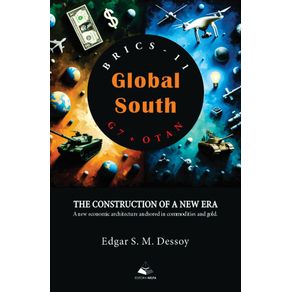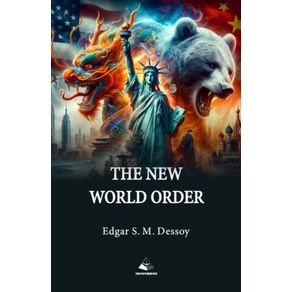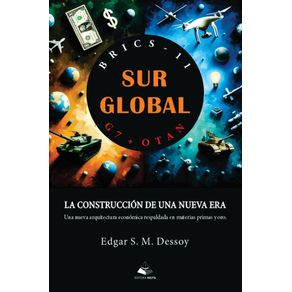| Selo | Books Express Publishing |
|---|---|
| Edição | 0 |
| Idioma | Inglês |
| Autores | Não informado |
| Acabamento | Capa Comum |
| Quantidade de Páginas | 664 |
| Origem | Literatura Estrangeira |
 O trabalho da obra Maquiavel (0605)
O trabalho da obra Maquiavel (0605)
Todavia
R$ 189,90 ou até 3x sem juros O país dos privilégios – Volume 1 (2506)
O país dos privilégios – Volume 1 (2506)
Companhia das Letras
R$ 94,90 à vista Ensaios sobre a guerra: Rússia Ucrânia 2022
Ensaios sobre a guerra: Rússia Ucrânia 2022
Kinoruss
R$ 116,00 ou até 2x sem juros Cidade-modelo e região metropolitana
Cidade-modelo e região metropolitana
EdUERJ
R$ 45,90 à vista I Seminário Internacional EBAURBE: refúgios, futuros habitáveis e reinvenção de cidades
I Seminário Internacional EBAURBE: refúgios, futuros habitáveis e reinvenção de cidades
Paisagens Híbridas
R$ 85,00 à vista O fim da esfera pública e a nova teoria da publicidade: lições de comunicação política
O fim da esfera pública e a nova teoria da publicidade: lições de comunicação política
Pimenta Cultural
R$ 79,90 à vista A Orillas Del Mar
A Orillas Del Mar
Clube de Autores
R$ 60,90 à vista Agora tudo é comunismo?
Agora tudo é comunismo?
Astral Cultural
R$ 34,90 à vista Opúsculo Humanitário
Opúsculo Humanitário
Montecristo Editora
R$ 59,90 à vista Essa é nossa república, Sócrates - Sem pontos fortes com um mar de fraquezas
Essa é nossa república, Sócrates - Sem pontos fortes com um mar de fraquezas
Ases da Literatura
R$ 49,90 à vista Não nos calamos
Não nos calamos
Terra Redonda
R$ 108,00 ou até 2x sem juros 13 anos de Lula e Dilma - Um balanço ( quase oficial ) dos governos petistas de 2003 a 2015 , para ajud
13 anos de Lula e Dilma - Um balanço ( quase oficial ) dos governos petistas de 2003 a 2015 , para ajud
Terra Redonda
R$ 68,00 à vista Global South: The Construction Of A New Era
Global South: The Construction Of A New Era
Nelpa
R$ 50,00 à vista De Temer a Lula - A democracia ameaçada
De Temer a Lula - A democracia ameaçada
Paraquedas
R$ 91,90 à vista Ferrovias, um tesouro perdido
Ferrovias, um tesouro perdido
Editora Albatroz
R$ 56,00 à vista O trabalho da obra Maquiavel (0605)
O trabalho da obra Maquiavel (0605)
Todavia
R$ 189,90 ou até 3x sem juros Feminismo, política e democracia - As mulheres e os caminhos de poder
Feminismo, política e democracia - As mulheres e os caminhos de poder
Dialética
R$ 157,90 ou até 3x sem juros Doutrinas Petistas
Doutrinas Petistas
Clube de Autores
R$ 58,90 à vista Análise Verbal E Visual Do Conceito De Democracia No Filme Zootopia
Análise Verbal E Visual Do Conceito De Democracia No Filme Zootopia
Clube de Autores
R$ 84,90 à vista A Orillas Del Mar
A Orillas Del Mar
Clube de Autores
R$ 60,90 à vista Pós-neoliberalismo & O Mito Do Sucesso Escolar
Pós-neoliberalismo & O Mito Do Sucesso Escolar
Clube de Autores
R$ 58,90 à vista Opúsculo Humanitário
Opúsculo Humanitário
Montecristo Editora
R$ 59,90 à vista Ações Eleitorais: Contra o registro, o diploma e o mandato
Ações Eleitorais: Contra o registro, o diploma e o mandato
Publique
R$ 229,90 ou até 3x sem juros Essa é nossa república, Sócrates - Sem pontos fortes com um mar de fraquezas
Essa é nossa república, Sócrates - Sem pontos fortes com um mar de fraquezas
Ases da Literatura
R$ 49,90 à vista Judeus não contam
Judeus não contam
AVIS RARA
R$ 39,90 à vista O Dezoito de Brumário de Luís Bonaparte
O Dezoito de Brumário de Luís Bonaparte
Paz & Terra
R$ 44,90 à vista Global South: The Construction Of A New Era
Global South: The Construction Of A New Era
Nelpa
R$ 50,00 à vista Democracia Pura - Teoria e prática do governo com participação direta de todos os cidadãos
Democracia Pura - Teoria e prática do governo com participação direta de todos os cidadãos
Difusão Editora
R$ 81,90 à vista Quem sair por último, apague as luzes - A Confederação Nacional da Indústria no golpe parlamentar de 2016
Quem sair por último, apague as luzes - A Confederação Nacional da Indústria no golpe parlamentar de 2016
Dialética
R$ 99,65 à vista De Temer a Lula - A democracia ameaçada
De Temer a Lula - A democracia ameaçada
Paraquedas
R$ 91,90 à vista O prefeito escritor
O prefeito escritor
RECORD
R$ 59,90 à vista O país dos privilégios – Volume 1 (2506)
O país dos privilégios – Volume 1 (2506)
Companhia das Letras
R$ 94,90 à vista Ensaios sobre a guerra: Rússia Ucrânia 2022
Ensaios sobre a guerra: Rússia Ucrânia 2022
Kinoruss
R$ 116,00 ou até 2x sem juros I Seminário Internacional EBAURBE: refúgios, futuros habitáveis e reinvenção de cidades
I Seminário Internacional EBAURBE: refúgios, futuros habitáveis e reinvenção de cidades
Paisagens Híbridas
R$ 85,00 à vista The New Order World
The New Order World
Nelpa
R$ 50,00 à vista A Nova Ordem Mundial
A Nova Ordem Mundial
Nelpa
R$ 50,00 à vista As jactâncias ululantes da política brasileira
As jactâncias ululantes da política brasileira
Mondrongo
R$ 49,90 à vista Feminismo, política e democracia - As mulheres e os caminhos de poder
Feminismo, política e democracia - As mulheres e os caminhos de poder
Dialética
R$ 157,90 ou até 3x sem juros O Ideal Pós-marxista De Justiça
O Ideal Pós-marxista De Justiça
Clube de Autores
R$ 55,79 à vista Essa é nossa república, Sócrates - Sem pontos fortes com um mar de fraquezas
Essa é nossa república, Sócrates - Sem pontos fortes com um mar de fraquezas
Ases da Literatura
R$ 49,90 à vista A busca da justiça cósmica
A busca da justiça cósmica
LVM Editora
R$ 49,90 à vista Não nos calamos
Não nos calamos
Terra Redonda
R$ 108,00 ou até 2x sem juros 13 anos de Lula e Dilma - Um balanço ( quase oficial ) dos governos petistas de 2003 a 2015 , para ajud
13 anos de Lula e Dilma - Um balanço ( quase oficial ) dos governos petistas de 2003 a 2015 , para ajud
Terra Redonda
R$ 68,00 à vista Global South: The Construction Of A New Era
Global South: The Construction Of A New Era
Nelpa
R$ 50,00 à vista Sul Global: A Construção de um Novo Tempo
Sul Global: A Construção de um Novo Tempo
Nelpa
R$ 50,00 à vista